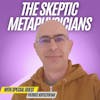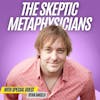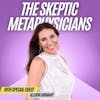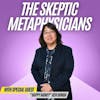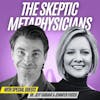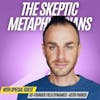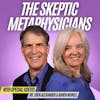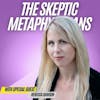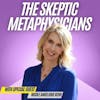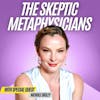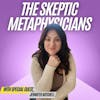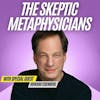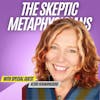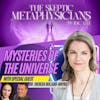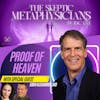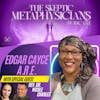Ecstasy as Medicine: Unlocking Love and Healing Through MDMA
Join us as we delve into the myths and realities of a powerful tool for personal growth. What if everything you thought you knew about MDMA (Ecstasy) was wrong? Discover the shocking truth that could change everything.
In this episode, you will be able to:
- Discover the therapeutic potential of MDMA for personal growth and healing
- Uncover the intriguing history and origins of psychedelic medicines
- Explore the potential impact of legalizing drugs on mental health treatment and spirituality.
- Challenge the effectiveness of traditional antidepressants and explore alternative options.
- Debunk myths and misconceptions about MDMA to gain a deeper understanding.
Links to our guest and a deeper dive about this episode at the blog: https://www.skepticmetaphysician.com/blog/mdma
Support the Show:
Buy Me A Coffee: https://www.buymeacoffee.com/SkepticMetaphys
Rate/review Us Here: https://lovethepodcast.com/SkepticMetaphysicians
Purchase Merchandise: https://www.skepticmetaphysician.com/store
Connect With The Skeptic Metaphysicians:
Website: skepticmetaphysician.com
Facebook: @TheSkepticMetaphysician
IG: SkepticMetaphysician_Podcast
Tik Tok: @skepticmetaphysicians
Other episodes you'll enjoy:
Unlocking the Divine Language of Coincidences
https://www.skepticmetaphysician.com/coincidences/
The Journey to Inner Peace: Channeling the Power of Nature
https://www.skepticmetaphysician.com/power-of-nature/
Discover Your Life's Purpose: Exploring Human Design with DayLuna
https://www.skepticmetaphysician.com/human-design/
Will: Welcome back to the Skeptic Metaphysicians. We have a special treat for ourselves today because we are excited to have one of our all time favorite guests back on the show.
Jonathan Robinson came on a little while ago and he, oh my gosh, the Stories, the wisdom, laughter that we had on the show was, incredible. to this day, this is one episode that I keep going back to when someone [00:01:00] asks me, Hey, I'd love to learn more about your show. what? So, uh, without further ado, Jonathan, thank you so much for coming on the show. We're excited to see you again.
Jonathan: Thank you
for that great introduction. Now I'm, I'm really, uh, gonna have a hard time to live up to that reputation, but we'll give it a shot.
Karen & Will: No pressure.
Will: I wanted to set the bar high so that you made sure to deliver because you always do.
Karen: Hey, I'm just glad he had his bag. He had us back. we are having him back. He agreed. I'm glad he said yes. Yeah. I know. We finally. Small words. I gotta use small words today. I'm all nervous.
Will: We don't very often get repeat guests after a while, they're like, Oh, do you want me to do what?
No, never again. These two. That was like traumatic experience. But, uh, so today we're talking about, uh, talking about traumatic experiences. We're talking about something that's going to help hopefully a lot of people. In our previous episode, you talked a lot about spiritual awakenings and how to get yourself from there, how to get, reach [00:02:00] spiritual enlightenment in a very short amount of time.
and that was based on a book that you had, and I read it by the way, and I loved it, and I go back to it all the time now. But now you have a brand new book, and it is in a very specific direction. And I'm just going to let you go ahead and
set the table for the audience.
Jonathan: Well, first, the name of the book is called Ecstasy as Medicine, and the subtitle is How MDMA Therapy Can Help You Overcome Trauma, Anxiety, and Depression and Feel More Love. What you might not know, Will, is that I might be the only person alive that got a master's thesis done on the value of using MDMA, which is also known as Molly or ecstasy, um, for the treatment of PTSD.
Um, because I did that back in 1984 and then, uh, three weeks later, the U. S. government made it illegal.
And you may not also know that in 2024, the FDA is going to make it a medically prescribed [00:03:00] drug. This is something that they have never done in their entire history. And the reason they're doing it is because they found that ecstasy is the most effective pharmacological medicine ever created for treating a variety of conditions.
And after 40 years of studies, they had to say, well, okay, it's safe, it's ridiculously effective. It's 20 times more effective than the next best treatment, and they wanted to make sure that veterans who are killing themselves could stop killing themselves by taking this medicine and healing their trauma, anxiety, and depression.
Will: Wow. Yeah. So we're going to talk a lot about myths and, uh, well, we're going to debunk a lot of stuff, I think, because when I was growing up, I had some, I grew up in the greater New York area and Uh, a lot of people I used to hang out with were pretty savvy about this kind of thing. However, there's all [00:04:00] kinds of things that said, if you do this, you can have, this is going to happen.
Or if you do that, that will happen and all the dangers and stuff. And it was like part of the fun. But before we go into all that stuff, I do want to touch on exactly what you talked about because not just MDMA, but also cytosibin and a lot of those psychedelic, you know, Uh, medicines that were being explored back in the sixties, um, that was doing a world of good.
Um, from what I understand that you, maybe you can help us steer the ship a little better from what I understand. It was kind of like, Hey, we're losing control of the young population. We need to stop this. And so they made it illegal now for them to come around all these years later and finally say, okay.
We're going to open the door to this one. Do you think it's going to open the door to a lot of
other things too?
Jonathan: Well, I think it's going to open the door to having science decide things rather than politicians or fear. So what the [00:05:00] science shows is that MDMA and also psilocybin are very effective for treating various conditions. And instead of having big pharma and money decide, uh, and politics decide what's legal and illegal, let's decide it based on what actually works or what actually does not work.
And that's a whole totally new thing. That took a lot of years and tens of millions of dollars to, uh, show that the science proved this was very effective. And also the science has proved many things that we thought were effective really are not effective. Like antidepressants tend to be very ineffective.
Uh, studies have shown that ecstasy is actually 30, 35 times more effective than some antidepressants. That's not a small difference.
Karen & Will: No. Wow. Before
Karen: we get too deep into it, . I, so I grew up pretty sheltered life. Like I have not been around a lot of drugs. What? I know, I know it's shocking, but it kind of is [00:06:00] shocking because I grew up in Florida, but
you got to survive there. No, but so, so things like ecstasy and psilocybin, were they created originally as like a, like an And as medicine, like with doctors and pharmacists, or are they, did they start out as
like recreational drugs?
Jonathan: Well, um, Ecstasy was developed in 1912 by a company called Merck, but they didn't know about its healing properties until the 70s when a guy named Alexander Shulgin kind of made it popular. And, uh, when I did my master's thesis, I was wondering, how are they going to abuse this drug? You know, because it, because it makes you feel good.
It takes away your defenses. It makes you feel a lot of love and peace. And a lot of therapists were using it. And never occurred to me somebody might use it as an all night dance party drug. Uh, which, you know, can be fun. I've been to a couple raves, but that's like using a laptop as a doorstop. You know, it works, but there's better uses.
Karen & Will: Yeah.
Jonathan: [00:07:00] so, so psilocybin, uh, well MDMA is a synthetic drug. Psilocybin comes from, uh, mushrooms. So you could say that God created that as a way to, uh, make us see things beyond our normal waking everyday mind.
Will: Right. But then you could also say that, uh, psilocybin or some mushrooms are. poisonous. So maybe it's just like, we're poisoning ourselves to, uh, and instead of we just barely survive and get these psychedelic trips.
Karen: Well, I mean, was it luck of the draw? Some people out there, they're hungry, they're looking around and they're eating mushrooms and wow.
Will: One of them died and the other one went on the trip.
Karen: I'll have what he's having.
Jonathan: exactly,
Will: You wait to be the third person to eat one of them. so, but yeah, I think if I, and again, correct me if I'm wrong, John thinks, you know, a lot more about this than I do. Although some people might think that some of my friends were going for a doctorate in this kind of thing, but it weren't.
Uh, but I do think that it was meant to be kind of, uh, medicinal, right. And then, [00:08:00] and then people got ahold of it and they got out and it did. Uh, become a party drug to your point, Jonathan, and not just, not just MDMA, but, but all kinds
of drugs like
that.
Jonathan: LSD, psilocybin, ketamine, all these things, you know, everything can be abused, you know, uh, sex is great, but rape is terrible, you know, so it's the same thing with drugs that, that you can use them well for good purposes, for getting over challenges from your childhood or getting over depression, or you can use them to, uh, you know, have an all night party and, and, uh, get sick.
Um, so,
Will: you had me up until the get sick part.
Jonathan: I've done both, so, you know, really, um, it's really important as these drugs become more legal, like medical marijuana became legal, and, uh, when, what's happening with psilocybin is that different states are creating [00:09:00] different laws, but with MDMA, it will be a federal law changing it, meaning it will be in every state, because it will be through the Food and Drug Administration, So that's a unique thing that's never been done before.
It'll probably happen sometime in 2024. And that's basically because the studies show how effective it is. You know, I can do two or three years worth of, like, weekly therapy in one afternoon with somebody on MDMA. So, in this crazy time we live in, you know, being able to Do therapy that's quick, effective, and convenient is a lot, very much needed.
Karen: Is it addictive? I mean, is there that fear, like with the, the whole opioid thing that's going on now, people getting over the pain next thing you know, they're hooked on it. I
mean, could that happen as well? Yeah. Yeah,
Jonathan: Yeah, that's a great question. It ends up that's what could be called anti addictive, meaning that the more you take it, the [00:10:00] less effect it has.
Karen: Oh,
Jonathan: even people who absolutely love this stuff generally won't take it more than once every couple months because if they do, it has no effect. So, um, it's not addictive, but you know, it, every drug, um, has some impact on the body.
And one of the things I do in the Ecstasy as Medicine book is I talk about like several supplements you can take that mitigate the, the after effects. So you're not tired the next day, for example. Yeah,
Will: we're going to talk about the, the, the side effects. But before we do that, I want to talk about the benefits of it. We already talked about the fact that it is extremely useful for veterans who are experiencing PTSD. Um, there's a lot of research behind it and it is remarkable to your point, several weeks of therapy in a single afternoon.
And I've even heard to the point where after a single dose, [00:11:00] Some veterans have, I don't want to say get better, but, but have seen incredible results after a single dose.
Has that been your experience?
Jonathan: yeah, you know, the the current model is to give people three doses eight weeks apart, but what I do is I work with people over Zoom, believe it or not, where I get even better results than in person, which is a strange thing. Yeah, that's that's very
Karen & Will: just look at it,
Karen: you know,
Jonathan: That's the next step, Karen, you know, the placebo dose. I have a story about that, I'll tell later, but yeah, I do most of my work over Zoom and I just do one session. I have a 93 percent success rate in curing people of PTSD in one session.
Karen & Will: one session. That's remarkable. Oh my gosh. Absolutely remarkable. Now, do people
Karen: have to be, um, a lot of people, you know, they hide it or they don't want to admit like, or they have a hard time uncovering the PTSD. Do they have to already be past that and kind of open and ready and know what's going on? Or can [00:12:00] you work
with both with this?
Can you
have the
Jonathan: can work with both. The actual studies done by the FDA were people with what was called severe PTSD, meaning they were not able to function in life. That's pretty severe, and they found that
85 percent of those people no longer, uh, or 80 percent of those people no longer had symptoms of PTSD three months later.
Karen: Oh my God. I'm thinking like this could solve the homeless population, you know, cause you hear about all these people that just, they go through the medical system, they run out of money, they're still having all these mental issues
and next thing you know, they're on the street.
Jonathan: Yeah, you know, in a time like this where we really need all the love and peace we can get and connection, I think this medicine has the potential to really impact the world in significant ways.
Will: Wow. No doubt about it. So PTSD. Yup. Check the box. It, when I think about ecstasy. [00:13:00] Um, and I've, and I've full disclosure, I've heard some of your shows where you talk about you and your wife doing it, uh, for different purposes and things like that. So are there other, and I know that they're legalizing it for medicinal purposes coming up in next year, but is there a chance that this might be legalized whole heartedly, or do you think it's going to take more for it?
But I guess before we go there, we need to talk about the other benefits that it has to other folks that aren't veterans that have
PTSD.
Jonathan: Yeah, um, well, probably a third of the people coming to me have PTSD, but not severe stuff, you know, just lingering things from their childhood, you know, trouble with a parent, uh, having trouble in relationships. A third of them are couples. It's magical with couples. I mean, it's, it's amazing. Um, I've saved so many marriages with this that, uh,
Will: magical with couples, Karen, magical with [00:14:00] couples.
Karen: I mean, we've got a pretty good relationship. I can only imagine. Can you
Will: imagine how much better it would be? I mean, I'm
just saying.
Jonathan: Yeah, right. You never know.
Karen: Session booked.
Jonathan: You know, I don't think my, my wife and I would be married if it weren't for MDMA because, you know, we about 10 years ago faced an issue that we just couldn't get over. We did an MDMA session with a therapist and it was, it was done. We haven't had that problem since. Um, and then maybe a third of the people come to me for spiritual enhancement.
You know, this is a medicine that helps people get in touch with inner peace and love. And while they're on the medicine, I get various clues as to how they are creating or opening to this love. And when they're not on the medicine, um, they have like a breadcrumb trail back to that. You know, it used to take me an hour of meditation to get to a place of peace with, uh, the ecstasy and other things I've done.
And now it takes only about [00:15:00] 20 seconds and that makes a huge difference in my life, obviously.
Will: I would say
Karen & Will: so.
Karen: Do you have to continue, continue taking it? Or is this like
you're good and you're set?
Jonathan: Um, I like to take it about once a year. Uh, and that's really what I've been doing for about the last 20 years.
Karen & Will: Wow. Yeah.
Will: Now get this, Karen. Uh, Jonathan, I also heard the story about your folks. I'd love to, I'd love to have, I'd love to have you share this. Yes. That's exactly why I'm going there.
Jonathan: So, um, you know, my parents were always wondering why I did all this spiritual meditation and gurus and such. And I said, well, you know, I'm going for a certain experience and state of consciousness. And uh, I said, you know, there is a drug that kind of mimics that state of enlightenment or fully opening and loving.
And to my surprise, they said, you know, well, can we try it? And I, I said,
okay, [00:16:00] so, you know, I, I told, I gave them the medicine, I told them how to create a good set and setting to take it and, you know, I kind of forgot about and then a year later I, I asked them, hey, by the way, did you ever take the MDMA I gave you?
And they said, Oh, yeah, yeah, we took it. And I said, So what happened? And they said, It didn't work. And I'm pretty skeptical, you know. I said, Well, tell me exactly what happened. Like, what happened that night? They said, Well, we took the medicine. We waited like 15 minutes and we didn't feel anything. Well, it ends up it takes about 45 minutes for it to take effect.
So I said, Well, when it didn't work, what'd you do? And then they put on this big smile on their face and they said, well, you know, it ends up we had the most wonderful night of our entire marriage. We ended up talking about how much we loved each other and how grateful we were for our lives. And then we cuddled for a couple of [00:17:00] hours on the couch.
Ended up being so wonderful. The only disappointment was that the drug never took effect. While I'm laughing, I said, well, when was the last time you talked about how much you loved each other and cuddled on the couch? And they said, well, that never happened before. That's what made that night so wonderful.
It's just too bad the drug never had any effect. And you know, that's one of the great, the great things about it is that it, you know, LSD or psilocybin, you know, you're on a drug,
Karen & Will: Okay.
Jonathan: but with ecstasy, you kind of feel like you're now we're on a drug. And when you take the ecstasy, you feel like. Well, that's how I should be feeling.
I should be feeling open and loving and peaceful, you know, um,
Karen: I mean, can I, can you, can I slip some to my dad, like stick in a sandwich? I love him, but he has become this very angry man.
And I don't know why. And I just, God, I just, like, I pray for him, I, I, you know, meditate, send energy that way. And I just don't know.
Will: Can you imagine him and [00:18:00] Barbara doing it together? Okay. Wait a minute. Let's clarify.
Karen: Let's clarify. No, I cannot.
Jonathan: well,
Will: Yeah. No, we, we love you, Bob. We love you. This is all in good, in good,
Karen: uh, spirit. But I mean, if it would make him feel better and just make him be, he was used to, I don't know,
he's become this angry person. It
makes
Jonathan: you know, as you get older, we often get set in our ways, and we all need a vision as to what it's like if we didn't have all these accumulated obstacles on us, and that's what one of the things that medicines like this can do is they can give you that vision, and, um, you know, when I first took it when I was 16, the next day I signed up for a meditation course.
I said, that's where I want to be. How do I get there? You know,
Will: Right. Then that's such a, such an important point to make, especially on this show where we're talking about spiritual awakenings and, uh, things like that, where this is, this is, I mean, for lack of a better term, a fast track to feeling what the feeling is [00:19:00] supposed to be like. 'cause there's so many people that say, uh, I don't know if I'm doing it right.
I mean, it's kind of, I fi I feel like it might be, but this kind of gives you definitive, like this is how it's supposed to
be,
Jonathan: Yeah, that's where the target is.
Karen & Will: That's it. Yeah. Exactly.
Karen: And then does it make it easier to reach that target?
Karen & Will: Well,
Will: that's what he said. Yeah. There's breadcrumbs
that they're laid in. Right.
Jonathan: Yeah, it's like training wheels. You know, you need training wheels when you first learn how to ride a bike, so you don't fall. Um, once you know the target, and when I help people on journeys, I'm asking them a lot of questions like, okay, where do you feel your energy? Now, can you close that energy down? How do you do that?
Can you now open it back up? What did you do to do that? So that you do have specific things you're doing in your mind and body that allow you to get back there without the medicine. And that's a great spiritual gift to be able to have that type of information. And it's different for different people.
Some people, [00:20:00] it's, you know, doing something with their chest or even something with their hands, where they spread their hands out, you know, like they're, you know, receiving Holy Spirit or something. Some people, it's a, they'll hum. Or there's a song that plays in their head, or there's a phrase, like, it's all perfect.
You know, it's very individual. And if I can find their recipe for finding peace and love within, then I feel like I've changed their life.
Karen: Oh my gosh. Absolutely. Now, does everyone have a positive experience or is it like alcohol? Some people are happy drunks and some people are, people are angry
drunks.
Jonathan: Yeah. Well, I've done about, in the last 40 years, I've led about 800 journeys. And I'd say two people had unpleasant experiences. So I'd say one in 400, you know, the only reason I can, and they weren't that unpleasant, they both thought it was valuable, but it wasn't fun for them. So about one fourth of 1%, I would say has a unpleasant [00:21:00] experience.
Um, one of the reasons I do this over zoom, I certainly wouldn't do any lead any other medicines over zoom, certainly not LSD or psilocybin.
Um,
Will: tackle them down to the ground when he's trying to take their clothes off or
something.
Jonathan: Exactly. Um, is that very predictable? I mean, it's more predictable than aspirin. If you get 400 people aspirin, one, one of them is gonna have a very bad experience.
But it's very predictable that people have positive experiences. And, um, also, uh, in my protocol, I'm talking to the person. We're doing therapy the whole time. Uh, so there's a real deep connection there. And if they start to have, you know, like, Sometimes we're going over difficult traumas, maybe a rape, maybe somebody they saw murdered, and I'm able to calibrate how fast to go into that.
And one of the things ecstasy does is it reduces blood flow to the amygdala, [00:22:00] which is the fear center of the brain. So people can revisit these difficult places, but without the, uh, fear or without the, um, avoidance that they might normally have.
Will: Oh, Jonathan, I need some of those so much.
Karen: Can it help unblock
suppressed memories?
Jonathan: Um, well, that does happen for sure. And maybe I don't know, 15 percent of cases where people had no memory of an event and in an environment that's safe enough. And with the medicine, they feel safe enough for those those memories to come out and be healed.
Karen: Wow. That's okay. So we'll, I'll let you, I just have so many questions. Uh, no, no. One more and then you can, you can have a turn. Absolutely. Go for it. Go for it. So part of the reason I had, like I said, I lived a shelter life, but I also kind of kept myself away from drugs because I don't like to lose control.
Jonathan: Yeah.
Karen: So if someone is having a session with you and they're having these conversations, do they, are they still in control or are they like, [00:23:00] Ooh,
you know, how does that work?
Jonathan: Yeah. It's good to make a distinction between MDMA and other psychedelics. With other psychedelics, there is a sense that you're losing control. Uh, I would say on MDMA, most people feel like they are more in control than they've ever been because they feel, uh, no anxiety or fear. They feel clear headed.
That's why I say it feels almost like, like you've been on a You've been a little bit drunk your whole life, and now everything's very clear, and you feel open, and you don't feel defensive. So there's, there is no sense of losing control in the way, uh, of other drugs, except for maybe about 10 or 15 minutes when you first come on to it, because you're, you're going through, you're kind of in between worlds in a
certain
Karen & Will: Mm.
Will: So I think that the stuff that I did back, I mean, the stuff that a friend of mine did back in the day, uh, was definitely different than what you're talking about [00:24:00] because now full disclosure, I am, I'm a one hit wonder, right? I, I, drugs hit me, whether it's aspirin or other things, I don't need a whole lot for, for me to have the effects.
So for someone like me, that gets. Get high on second hand smoke. Are there different? Um, I'm assuming there's different doses that people can do First of all, and then I'll ask you
the follow up question after that
Jonathan: Yeah. Um, although there's not that big of a range for MDMA, a standard dose is about 120 milligrams. Uh, that works for most people. Some people are more sensitive, some people less, but one of the problems, and there are. We, you know, there are problems with this medicine. I do want to state them because anything that's powerful, you know, can potentially have a downside.
One of the downsides is that 50 percent of what's sold as ecstasy in America is not [00:25:00] pure ecstasy, and that's a problem.
Will: Yes.
Jonathan: Um, there are test kits you can get. Uh, so, you You know, a lot of it has methamphetamine, it has bath salts in it, and those can be a problem. I would never use ecstasy in which somebody else I know and I've talked to hasn't used the same batch and they can tell me that's good stuff or that's bad stuff, you know, um, or tested it chemically.
Will: So no, I shouldn't say that. My friend had a really good time on it eventually, but at first it was very difficult.
Well, maybe to your point, the bridging the two worlds, uh, Getting yourself used to it might be what, what happened, but after a while, I was like, Oh, this is
actually nice. I mean, that's what he told me,
Jonathan: Yeah, yeah, yeah. Um, very good friend there. And, and probably, you know, after maybe 15 minutes, I, I like, I like to tell people that you're probably going to go through a 15 minute period where you feel kind of discombobulated, maybe even a little bit nauseous. [00:26:00] And, uh, then you'll feel good again. And that's pretty typical.
Will: it a
pill
Jonathan: Well, it can be, it can be a pill. It can be a powder. It can be, um, a crystal. Uh, it can be in any form pretty
Will: Okay. But you don't smoke it, right? You actually just ingest
it.
Jonathan: No, yeah, you ingest it.
Will: Okay.
Karen: No spoons involved. I've seen the movies. I'm not that sheltered.
Jonathan: Okay. Um,
Will: was cough medicine, Karen. Cough
Karen & Will: medicine. Robitussin.
Will: Robitussin. All right. Well, then let's turn our attention to the, the myths, the, all the things that, that were out there, uh, specifically made to get us to be afraid of going out there and taking it.
Now, in all deference, uh, street drugs, probably not the best way to go about it because you never know what. What, like you said that your point that it could be mixed with stuff and it might not be safe, but, um, [00:27:00] let's take one at a time. One of the myths that we heard, or one of the things, one of the scare tactics was that I mentioned it before we went on break.
When you took ecstasy, it drained the spinal fluid of your body. And that's why you felt so tired the next day. Is any basis to
that?
Jonathan: no, there's no basis to that. What happened was that the U. S. government was funding certain labs with the express desire to please show us anything that could possibly be harmful about the substance. So, one of the guys who had been a respected scientist showed that there was all kinds of stuff that could happen as he dosed monkeys and baboons with ecstasy.
And the journal Science, a very respected journal, published his results, which were really scary. It ends up it came out that he had not used ecstasy, he had used enormous doses of methamphetamine, better known as speed.[00:28:00]
Karen & Will: Oh my
God.
Jonathan: So they had to retract the article, but in the retraction, you know, the media jumped on ecstasy kills baboons, you know, or things like that, or creates holes in your brain.
All of that was based on his research, which was, uh, we still don't know if he Tried to sabotage it or what happened, but they do know that they, the, the subjects in this experiment didn't actually get any ecstasy, they got methamphetamine. So that, um, didn't get the media attention when it was retracted and that took like, you know, that was 15 years of, of bad publicity based on faulty science.
When the actual, when the actual science was done, uh, effectively, they showed that, um, there is, it does use a lot of the serotonin in your brain. And if you take ecstasy every day for a couple of weeks, that can really hurt your brain. [00:29:00] But if you take ecstasy every day for a couple of weeks, it stops working after about day three.
So nobody does that.
Karen & Will: Right,
Will: you've touched on a lot of the other myths I was gonna touch on with the holes in your brains and all that kinda stuff, and, um, one that, it might've been used as an excuse, I don't know. But one of the things that you hear is that you lose complete. All inhibitions. So, if you're in a club somewhere, you can do all kinds of things without even meaning to.
Is that right?
Is that real?
Jonathan: Well, I would say the set and setting is really important. You know, if, if everybody in your club has taken off their clothes, whether you're on ecstasy or not, you're probably going to do that yourself. And if you're, if you had, if you had a drink or if you had ecstasy, it makes it even easier. So, um. I would say that it loses your defenses, meaning you, you are no longer, um, uh, taking everything [00:30:00] so personally.
You're more likely to feel a lot of love and want to connect with people. Can that be taken advantage of? Yes. Um, but hopefully you're, you take it in a setting that is safe enough where people are not trying to take advantage of you.
Will: right. So the people that you're sharing love with actually love you back.
Jonathan: Yeah,
Yeah.
Will: Yeah, that's important. So Karen, that's your natural setting. So I think you're good.
Karen: You don't think
Will: I show enough love? No, I don't know. You do. That's my whole point. That is your natural state. It'll be no different. It'll be like, it'll be like Jonathan's parents or nothing happened. Didn't take effect.
Jonathan: You know, a set in setting is really important. I had one client come to me. They, he had never had a spiritual experience. So, um, you know, we were working in that way to use the ecstasy for that. And during the journey, he said, oh, I feel more love and peace than I've ever felt in my life. Well ends up that night.
He calls me up and he says, you tricked [00:31:00] me. I said, what do you mean? He said, well. I took the other pill, it was the magnesium pill. It's good to take magnesium with ecstasy because one of the side effects is a tight jaw. And if you take a magnesium supplement, you don't have to worry so much about that side effect.
Well, it ends up he had taken the magnesium pill earlier in the day with me, and because of the set and his intention, he was feeling all this love. Well, later that day, he took the actual ecstasy and he was going through it again. Well, you know. Your mental set or your intention really, and how you take it and who you're taking it with does make a big difference.
Will: Right. Yeah, that makes perfect sense. So, you're not suggesting that people, go to the club in Miami and take. ecstasy and go raven, although, I mean, not too much harm in that is what I'm hearing from you.
Karen: Well, you don't know how this is in the club. You could be taken advantage of. Well,
Will: yeah.
This day and age. Yeah. I guess you need to [00:32:00] have like guides with you. So Jonathan, what are you doing next weekend?
Jonathan: Just, just tell me where and when, Will, and I'll be there.
Karen: Oh, that'd be a fun
Karen & Will: podcast.
Will: Right, right. Uh, all right. So then walk us through this because obviously. MDMA is not widely available right now, nor should you probably take this on your own, or should you? Is it safe to take, like Karen and I decide, Karen and I, we're going to do it without a guide, or do you really recommend we reach out to you and say, hey, guide us, or
can we do it on our own?
Jonathan: Well, it
depends what your intention is. If you want a therapeutic intention, a guide is really important. Because when you feel so good, you don't generally, by yourself, decide, Well, let me go back to that time when I was hit by my dad and five years old and had, you know, all this trauma. That's not generally where you go.
Um, but it's a very safe drug if you're getting real ecstasy to take by [00:33:00] yourself. Um, in, in the book, Ecstasy as Medicine, I talk about how to do a self guided journey. I talk about how to do a, a journey on your own with your, with a significant other, a partner. So, um, it's not unsafe if you're getting the real medicine, but it's harder to go deeply into therapeutic stuff on your own.
Will: I gotta go there. And I know you don't, don't want me to go there, but I gotta go there. You just said it. If you get real ecstasy. Now it is not currently available legally in the United
States. So if someone wanted to do something like this that was not guided, that was just Karen and I,
how would someone go about getting something like this? Or should we not even
Will: talk about this?
Jonathan: I, I know listeners
are always interested in that, so I, you know, I do a course on teaching people how to do MDMA. Facilitated therapy, and I have several hundred people in that course. So you bet you [00:34:00] this this conversation comes up,
right?
Will: I don't feel so bad now then.
Jonathan: And what I have found, well, one of the things I do is I avoid doing anything illegal. You know, people ask me, Are you worried about getting arrested? I said, No, because I don't do anything illegal. You're allowed to talk about anything in free speech. I talk about how to do this type of therapy. Now, um. When people ask me, how do you get the medicine? I say, uh, there's a, a, uh, app known as Signal. Are you familiar with the Signal app?
Will: We are.
Yes.
Jonathan: encrypted and you can go on there and say you're interested in getting MDMA medicine. Now, if I were wanting to get MDMA medicine, I would make sure that I knew the person selling it, or I knew somebody who had taken the same batch, because, or I would get a test kit to make sure that anything I received was [00:35:00] pure.
this way I avoid doing anything illegal, and even my, uh, people learning how to do this therapy are not doing it. They're just Telling their clients to go on Signal and, uh, see what they can find. Now Signal, Signal luckily is fully encrypted. The law enforcement doesn't get into it. Um, and I guess that's what we need to do until it is medically prescribed.
Will: And then even then, it's, I mean, in a lot of states, marijuana is generally legal. It's, you don't need prescription for it. Other states you do. MDMA, when it's first legalized medicinally, you will have to have a doctor who helps you to acquire this medicine. So signal might still be around for a while.
Jonathan: Yeah, it might.
Will: Cause that's the question that's been, you know, you hear all about all this stuff on the shows and it's like, that's great, but how do I get it? Like, what do you do? Cause it's, it's, it's [00:36:00] really, it's, it's not, it's not, it's unfortunately not legal after we've talked. It's almost an hour now about the wonderful benefits of this kind of medicine.
They've done the right way. The problem is sometimes people don't do it the right way and that's why one
bad apple spoils a batch.
Jonathan: And I want, you know, in the book, I also talk about other contraindications. Um, people on SSRIs, uh, antidepressant medicines, usually have to go to a very low dose before they can feel this medicine. Uh, I have people work with a doctor to lower their, their, uh, antidepressant medicines over like a two or three month period because it just, it's the same neurotransmitter pathway.
It mutes the response. Uh, and also one third of people do feel tired and kind of, well, just tired the next day. Uh, in my book, I talk about how to prevent that. But, you know, for people who have had, like, God, I took it years [00:37:00] ago and I felt really exhausted for a day or two, that is not uncommon, but there are ways to mitigate that.
Karen: Great. How long does it last? How long does that feeling that
it gives you last?
Jonathan: Um, generally four to five hours, something like that.
Will: Oh, okay.
So you get a good money's worth, I would say.
Jonathan: It's funny, the people I do this with on zoom, they have no trouble sitting and talking to me the entire time without a break on zoom. They never asked for a break. I usually say, Hey, you know, we've been here for hours and I, and I go to the toilet, you know,
Will: Does it, does it have like a, a speedy feel to it that, that makes you, um, I mean you hear people who are on methamphetamines or even cocaine will, will just become really chatty. Is that
same type of thing?
Right.
Jonathan: does that. It does make you very alert, but, um, some people actually, you know, when they're opening to love, they don't feel like talking that much. You know, this is great. You know, let me just [00:38:00] bask in this, but some people do get chatty.
Karen: and do you typically, when you're with your, your clients or your patients during this, are, are you on the whole time with them usually, or is it just a couple hours and then
you just let them go and enjoy?
Jonathan: I'm on the whole time. Um, and you know, one of the reasons I do this, uh, Will and Karen is, um, I get a contact high. Have you ever been around somebody who's, who's feeling like this is like the best time I've had in years?
Karen & Will: Yes.
Jonathan: you're sharing it. I don't take the medicine, but I do get a contact high, and that's kind of fun.
Will: Out of all the things you said this entire night, that has to be the most amazing thing you've said so far. That's awesome.
Karen & Will: Wow.
Oh,
Jonathan: It's really fun. Um, and, and, you know, that's not just me. The people that I've trained, they, they say, Uh, well, you know, I, I charge money for this, but I do it for free because I get so high when I'm helping people with this, you know.
Will: That's awesome. Oh, gosh. [00:39:00] Now, I remember one of the things that everyone said when, when my friend took it way back then is you had to constantly drink water. You had to keep rehydrating. You had to yourself because if you didn't, uh, it was, it, you could
really hurt yourself. Is that true?
Jonathan: Well, it's true depending on the setting. It's not true that you actually have to drink any more water on MDMA than usual. But the people taking it were in a hot, uh, dance club dancing for seven hours. Well, if you dance for seven hours and it's hot, you need to drink a lot of water.
Will: Got it.
Jonathan: Um, but if you're sitting talking to a guy on Zoom, you know, taking a sip of water once an hour is usually pretty good.
Will: Got it. All right, so then you've done, like you said. about 800 journeys on this stuff. You must have some,
right, I'm sorry, leading, not, not journeys yourself, but leading journeys. You must have incredible stories of people that went through some sort [00:40:00] of transformation can you share some stories with us to get us to the place where we feel more
comfortable doing something like this.
Jonathan: Yeah, well, let me first share a story of, uh, Martha and Joe, who I've been working with for a year in my office, not gained any progress. They've been arguing about money for ten hours. a week for 30 years. And, um, finally, you know, they didn't want to get divorced because of finances. I said, hey, the only thing I think it's going to help is MDMA and, you know, they were in their 60s, but they decided to give it a shot.
Um, and you know, the whole hate and resentment and, uh, issue just dissolved.
Will: Like power struggles,
Karen & Will: you know?
Jonathan: The whole thing, you know, it's very hard to work out a problem with somebody you hate and don't trust.
Karen & Will: Yeah.
Jonathan: easy to solve a problem with somebody you totally adore and you trust implicitly. So it [00:41:00] took about 15 minutes to come up with a solution.
They both said great and they, you know, just loved each other. Well, you know, I always do an integration session a week later. You know, uh, over zoom, not on the medicine, but just to make sure that everything's good and how to take the insights and put it into their life. And I said, how'd that, you know, the agreement go?
And they said, this is a first week in 30 years. We haven't argued. We didn't know that we even liked each other, but now we know we love each other. And it was, it was, it was so powerful to them. They thought it was like total magic. And, um, and the agreement that we made, uh, I, I made the, I told them, why don't you just give Martha 300 bucks this week to spend any way she wants?
And he said, that's ridiculous amount of money, but you know, if it'll keep her quiet for a week, okay. And Martha said, 300 bucks. That's so little. How can I possibly do that? That cheap bastard, you know, but they were willing to do it for a week. [00:42:00] Well, after a week I said, does that work for you? And they both said, well, it's totally unfair, but I'm happy to do it because anything that can get us to not argue, uh, works for me and we're now we're in love. So,
Karen & Will: that's wonderful. All right.
Will: So what do you say to those people that feel that maybe it's the drug that has drugged them to thinking they're in love rather than them actually
feeling love for each
other?
Jonathan: Uh huh. Well, I judge things by the results. So, if a week later, they're still in love, and they've worked through their problems, which is what I tried to do on the session, then I don't care whether it was chemical or not, if they're in love now, not on the medicine, and they've worked through their problems, that got me, and got them, the results that they want.
What I find is when, uh, people can let go even temporarily of their defenses and rationally work through their problems, all these obstacles to love tend to dissipate. And what's left is we like to feel connected to people if [00:43:00] those obstacles aren't, like, in the way.
Will: So then, along the same line, someone who's doing it for spiritual purposes, uh, you hear a lot of people say it's, you know, these things are crutches and it's, it doesn't really help in the long run because you really need to find it within yourself. The same argument. Could apply. Maybe it's the drug that's making me feel this way.
Not me tapping into anything. How do you
respond to that? Right.
Jonathan: Well, the drug is making them feel that way. The question is, uh, what's normally in the way. You know, when people are on the drug like this, I usually ask them. So, um, Will, or not that you took it, but your friend
named Will.
Will: My friend. Yes. Very good friend. Very good
friend. Yeah.
Jonathan: um, I might say so what's normally in the way of you feeling this way and we go into that if you can see the obstacles and you can work through them therapeutically, what's left in my belief is we do have a loving nature at the core, you know, you look at the [00:44:00] average three year old having a good time in life.
You know, there's not so many obstacles. They're laughing a lot. They're playing. They're not thinking about their taxes. You know, it's it's a lot better. Okay. So, um, I, I use the information to help people when they're not on the medicine, get back to that place that they felt on the medicine. And I do believe that's more of our natural state.
Will: That's what they say, right? We, that we, we are love and we just forget when we come here and we're trying to get back to that place. And we talked about it the first time you were here on the show.
Jonathan: Yeah.
Will: I cannot believe that we've been at this for as long as we have. It is the time, literally you are a time warp.
Whenever we talk to you, it's like two
seconds and it's already almost over. It's
Karen & Will: cause
he showed
Jonathan: Well, I put some ecstasy in your waters, Will,
so,
Will: Ah. Aha. Aha. I
Karen & Will: had a feeling. It's actually four hours. It's really
Will: tomorrow. Oh, I've got a hell of an edit job ahead of me. Uh, so, but before we go, I'd [00:45:00] love to hear one more story. What's your favorite story having to do with MDMA?
Jonathan: Well, besides my parents story, which was, I thought, hysterical when that happened,
um, you know, I, I get emails every day. I, I'll tell you the one that happened today. Um, the woman said, you know, My only regret is I didn't do this 30 years ago because it feels like I've been looking through like glasses that were totally dirty and fogged up.
And now I see clearly and every day I'm like so thankful for my, my health, my, my kids, my house, my electricity. You know, how is it that I wasn't feeling that before? Um, and, and it's so close You know, we get caught up in our minds, and our minds are only about a foot away from our heart, but that can be, it's [00:46:00] only a foot away one way, but if you go north, it's 25, 000 miles, So, um, she says, I feel like you gave me my heart back and it's not what I did. It's that she discovered how to open her own heart. And once you have that, you have a friend for life. So that's, that's what I'm trying to do is give, give people the recipe to their own. natural openness. And, uh, and then, you know, in the integration session, we talked about how to the little practices you can do to keep that going.
Karen & Will: Mm.
Will: Wow. Karen, we're doing this. All right. We're doing it. We're doing it. Jonathan, we're going to reach out to you. Yes. Do we have to be like on a, on a couch or together? Could we do it on a microphone? Like, can we record the
session if we do Ooh, that might be
weird.
Jonathan: Yeah. No, I always record the sessions. I
always
Will: do.
Ooh. Yeah. Yeah.
Jonathan: People
find
Will: Do they
Karen: know?
Karen & Will: [00:47:00] You
Jonathan: on signal.
Karen: trade it for, uh, for
ecstasy.
Jonathan: The guy has to make a
Will: other kind of,
Jonathan: No,
Will: yeah, that's a whole other kind of OnlyFans page.
Jonathan: No, actually I have them record it and, uh, they listen to it and they say that the recording is just mind blowing for them because they feel like that's them at their best and it gives them uh, a clarity as to who they would be if some of these obstacles were out of the way.
Will: So probably way too personal to release as a
podcast is what you're saying.
Jonathan: Yeah, yeah,
Will: Yeah.
Jonathan: true. It depends on how It depends on you, but, you know,
Will: Oh my gosh, Jonathan, I, I swear we, you need to come back a third time because I just, I can't. Oh my God. It's so much
Karen: fun. It goes fun and learning. It does.
Will: Yeah. It goes by so fast. the [00:48:00] book is called Ecstasy as medicine. And, is it out now? Can people get it in on Amazon or
is
Jonathan: Kindle, paperback, audiobook, um, smoke signals, whatever you want.
Will: and then someone wanted to reach out to you specifically to perhaps talk about maybe a guided journey. What's
the best way for someone to do
that?
Jonathan: Well, they can reach me through the website, which is xtcasmedicine. com.
Will: Perfect. Great. We're going to add a link to that website directly, uh, also possibly a link directly to the book because I think that if more people were open to the possibility of something like this, to Karen's point earlier in the, in the show, this might just change the world. And that's, we need a little, we need a lot more love in the world right now.
Jonathan: We do, we
do.
Will: Jonathan, as always, so, so much for coming on the show. And we just love you. We
- We do.
Jonathan: The feelings likewise. And we're not even on
ecstasy!
Will: I know. Can you imagine? [00:49:00] I can't wait. thank you so much for coming on again and we'll talk again soon for
Jonathan: Okay, sounds great.
Will: And a huge thank you to you. Yes, you, the person that hit play on this episode. We'd love for you to contribute by sending us a voicemail or an email from our website, or leave us a review on Apple podcasts or any other podcasting platform that supports them.
Karen and I love hearing from those that are moved to message us. It truly does fuel our passion. You are the reason we do this show and knowing what you like and don't like, help us craft the very best show we can so that we can help raise the vibration of the planet together. Well, that's all for now, but we'll see you on the next episode of The Skeptic Metaphysician. Until then, take care.
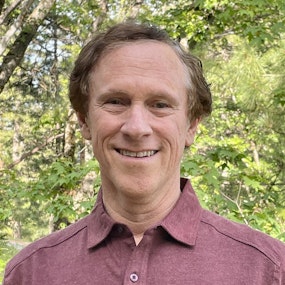
jonathan robinson
author
BIO FOR JONATHAN ROBINSON, M.A., M.F.T.
Jonathan Robinson is a psychotherapist, best-selling author of 14 books, and a professional speaker from Northern California. He has reached over 200 million people around the world with his practical methods, and his work has been translated into 47 languages. Mr. Robinson has made numerous appearances on the Oprah show and CNN, as well as other national TV talk shows.
Jonathan’s most recent book is called The Enlightenment Project: How I Went From Depressed to Blessed, and You Can Too. In it, he shares the best methods, stories, and ideas he’s learned from interviewing 100 spiritual teachers ranging from Deepak Chopra and the Dalai Lama to the late Mother Teresa, Wayne Dyer, and Ram Dass.
As a professional speaker, Mr. Robinson is known for providing his audiences with immediately useful and powerful information, presented in an entertaining and motivating manner. Jonathan is the co-host of the podcast Awareness Explorers, and his website is www.The EnlightenmentProject.net. On his site, you can download a free ebook on the easiest and quickest ways to awaken.












